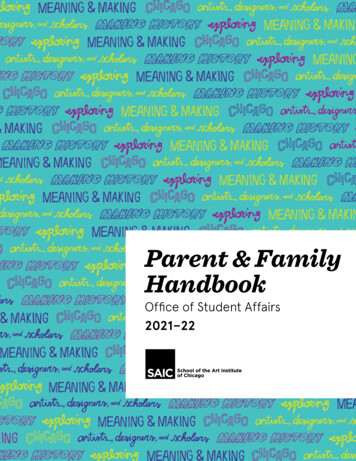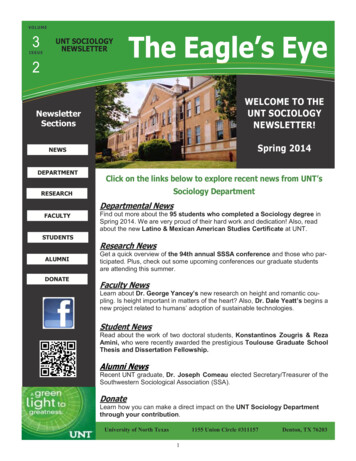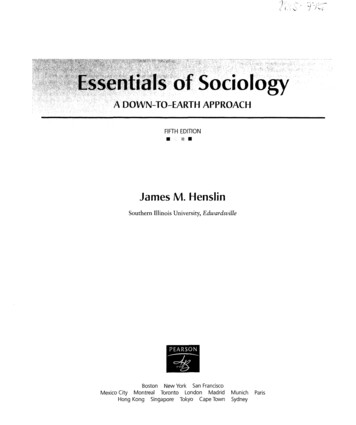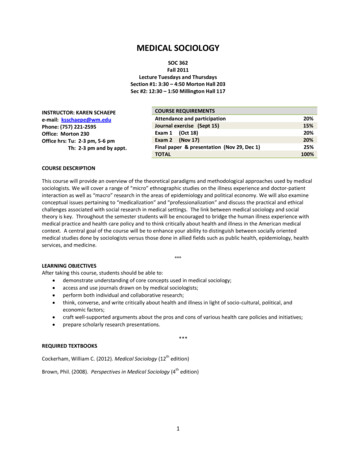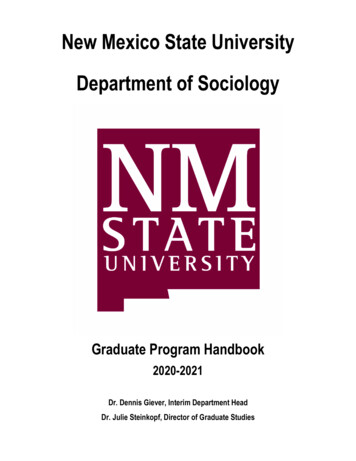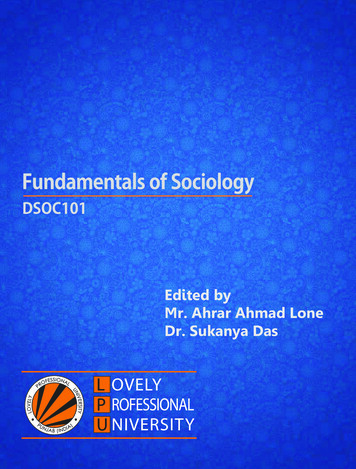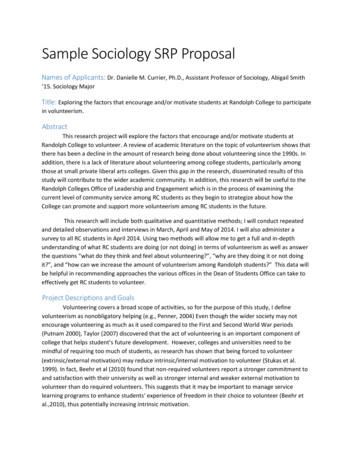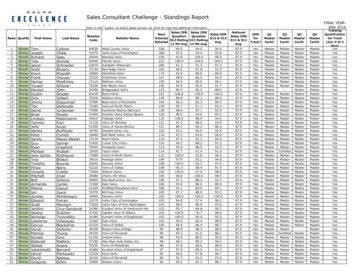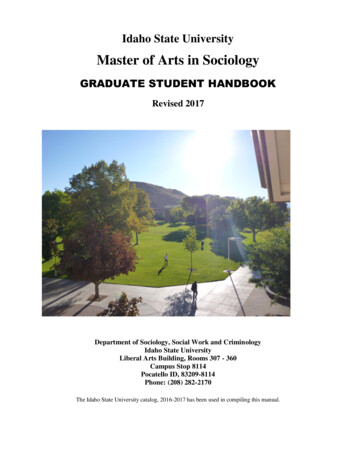
Transcription
Idaho State UniversityMaster of Arts in SociologyGRADUATE STUDENT HANDBOOKRevised 2017Department of Sociology, Social Work and CriminologyIdaho State UniversityLiberal Arts Building, Rooms 307 - 360Campus Stop 8114Pocatello ID, 83209-8114Phone: (208) 282-2170The Idaho State University catalog, 2016-2017 has been used in compiling this manual.
TABLE OF CONTENTSDescription of Graduate Program . Introduction . . . . Program MissionGraduate Study in Sociology at Idaho State University .The LocationA Word on Graduate StudiesUtility of an Advanced Degree in Sociology. . .Admission . . Tuition and Fees .Financial Aid . . . . .Degree Requirements and Procedures . .ProgressCurriculum Requirements . . .Progress .Comprehensive Examinations . . . .Thesis .Thesis Committee . Thesis Proposal . .Thesis Writing .Thesis Defense . .Thesis ClearanceApplication for Graduation . .AppendicesChecklist for Requirements and Procedures .Course Descriptions . .Faculty Members and their Research and Teaching Interests Application for Graduate Teaching Assistantship . .Plan of Study .Final Program of Study .2
DESCRIPTION OF THE MA PROGRAM IN SOCIOLOGYIntroductionThe Department of Sociology, Social Work, and Criminology at Idaho State University offers aprogram leading to the degree of Master of Arts in Sociology. This handbook describes theprocedures for completing the MA degree in Sociology. Careful reading of this handbook shouldassist students in their progress once they are accepted. The handbook is not intended torepresent all policies and procedures, and it is supplemental to the graduate catalog with whosepolicies and procedures you should become thoroughly familiar. If you need clarification on anyof the policies or procedures, please speak with the Director of the Sociology Graduate Program.Program MissionThe program’s mission is to encourage students in developing theoretical and methodologicalcompetence applicable to their chosen fields of interest. We develop sociologists who are able toengage in teaching, research, or professional service and who are capable of investigating, andevaluating changes in both the social world at large and in their professional field. Our graduateprogram offers close personal contact between faculty and students. Class sizes are small,encouraging student/faculty interaction.Graduate Study in Sociology at Idaho State UniversityThe MA program in Sociology is the only graduate program in Sociology in Idaho. The programis part of the department of Sociology, Social Work and Criminology. Since its inception in1979, the graduate program in Sociology has granted 65 degrees. Annual enrollment numbersvaried from 5 to 15; currently we have around 10-12 graduate students per semester.Five faculty members in sociology teach and advise the students in the MA program. Theprogram receives support from three Social Work faculty members in our department. Our socialwork faculty members have varied academic backgrounds and training in different disciplines inaddition to social work. They also teach graduate courses, involve students in research projects,and serve on thesis committees.The program offers a comprehensive MA-level curriculum. Our curriculum is demanding andmeets the standards of our discipline. The curriculum requires 33 credits, a thesis proposalpresentation and defense, and a MA thesis with a final oral defense. The theses written by ourstudents constitute solid sociological research.We currently have one formal area of concentration in Criminology. Classes for the area ofconcentration in criminology are shared with the Department of Political Science. Faculty offersexpertise in criminology, environmental sociology, medical sociology, religion, social diversity,sexuality, gender studies, leisure and deviance, family sociology, quantitative and qualitativeresearch methods, gerontology, community, social theory, media sociology, sociology of sport,and social psychology. Faculty members in our department are very active scholars. Theyregularly publish in peer-refereed journals; they conduct research projects, and actively pursuefunding sources for their research. A list of our faculty members and their teaching and researchinterest can be found in the appendix.We pride ourselves with advancing students through the program swiftly. Students typically take2 -2.3 years to graduate. Students who have gone on to earn doctoral or professional degreeshave commented on the quality of instruction they have received in our program. Students saythey felt well prepared for doctoral or professional studies and were able to compete withstudents who had graduated from prestigious programs. Students who entered the workforce3
have also given us very positive feedback. The skills learned in our MA program have preparedstudents well for the demands of their jobs and have often enabled fast career advancement.The LocationISU is located in Pocatello, Idaho. Pocatello, with a population of about 54,000, is located in ahigh desert and mountainous area in the Rocky Mountains in close proximity to YellowstoneNational Park, the Grand Tetons, and the Frank Church Wildness. Outdoor activities andrecreation are readily available year round. The area offers affordable cost of living, symphony,theatre, hiking, biking, skiing, boating, four seasons of weather, and rural and urbanopportunities for research.A Word on Graduate StudiesIn important ways graduate work differs from the undergraduate experiences. It requires you tothink independently and to master methods of analysis and styles of interpretation rather thanmemorizing neatly packaged facts. It requires dedication and commitment to learning thatexceeds what is included on a syllabus. As a graduate student, you are responsible for mappingyour course of study within the bounds of our program. In addition, you are responsible fortaking the initiative in selecting an advisor with whom you meet regularly in order tosuccessfully complete the degree program. We recommend that you meet with your advisor atleast once each semester to discuss your academic progress The faculty members are here to helpyou in any way they can, but your progress through the graduate program is your responsibility.Utility of an Advanced Degree in SociologyGenerally, a graduate degree in sociology prepares for two types of careers: academic andapplied. Within the academic setting, the MA degree enables graduates to teach at the4
community college level. Often graduates pursue Ph.D.’s in order to expand their employabilityin tenure-track teaching and research positions to other academic institutions. Not everyonepursing a MA is intent on teaching sociology in academic settings. Many are preparing for whatis generally called “applied sociology.” Opportunities for employment as a sociologist exist inindustrial, medical, and public agencies. Tasks performed in such settings by individuals who aretrained in sociology range from applied research to census work, from administration ofprograms to program development, from evaluation of past programs to planning future needs.Where have our students gone?Associate Professor of Sociology, University of HoustonAssistant Professor of Sociology, College of Southeast IdahoAssistant Professor of Sociology, BYU- IdahoInstructor in Sociology, Boise State UniversityInstructor in Sociology. BYU-IdahoAssistant Dean of Students, BYU-IdahoAcademic Counselor, Southern Oregon UniversitySociology, Ph.D. Student, Washington State UniversityDemography Ph.D. Student. U. Texas, San AntonioSociology Ph.D. Student, Utah State UniversitySociology Ph.D. Student, University of OregonSociology Ph.D. Student, University of MissouriSociology, Ph.D. Student, Case Western Reserve UniversityDirector, Market Research Company, Salt Lake City, UtahStatistician Demographer, U.S. Census BureauProgram Manager, Developmental Disabilities AgencySenior Research Analyst, Idaho State PatrolExecutive Director, Help Inc.Alcohol Rehab Counselor, PocatelloPerformance Analyst, Work Force Adjustment Board, San Diego, CaliforniaResearch Director, Private Research Institute, Ogden, Utah5
ADMISSIONThe student must apply to, and meet all criteria for, admission to the Graduate School. Inaddition to the general requirements of the Graduate School, the student must comply with thefollowing departmental requirements: Students must submit the GRE. Students must score a minimum of the 40th percentile in one of the three sections of theGRE. Grade point average of 3.0 or higher (on a 4.0 scale) for the last 60 credits taken as anundergraduate, or permission of the Graduate Director. Include a statement of interest and career goals. Three letters of recommendation must accompany the application. Include a writing sample.It is not necessary that a student’s undergraduate major be sociology. However, for fulladmission to the graduate program in Sociology, the student must have completed the followingcourses or their equivalent: Introduction to Sociology, Social Theory, Social Statistics, and Social Science Research Methods.In cases of deficiencies, students may be granted waivers, alternative courses, or Classified withPerformance Requirements (w/PR) admission at the discretion of the Sociology GraduateDirector. Courses that are taken to compensate for undergraduate deficiencies cannot be appliedto the 33 required credits for the graduate program.Please refer to the webpage of the Graduate School at Idaho State University ions on application and admission procedures.In brief, the following are required:6
View from Red HillTUITION AND FEESGraduate students will be charged fees as full-time students whenever they enroll for 9 credits ormore. For financial aid purposes, graduate assistants/fellows and students receiving otherfinancial aid must enroll for 9 credits per semester to be considered full-time.Fees are subject to change without advance notice by the Idaho State Board of Educationprior to the first official day of class.TuitionGraduate ResidentFull-Time (9 credits or more) 4,251 per semesterPart-time (8 credits or less) 426 per creditGraduate Non-ResidentFull-Time (9 credits or more) 11,291.50 per semesterPart-time (8 credits or less) 655 per creditStudent Health InsuranceIdaho State University does not require students to have health insurance, however they arestrongly encourage you to get insurance.7
Michael J – the program foxFINANCIAL AIDThere are seven sources of financial assistance available to graduate students in Sociology atISU.Teaching AssistantshipsEach year, our program receives a number of teaching assistantships for graduate students. Eachteaching assistantship carries with it a stipend of approximately 12,800 over a nine-monthperiod. In addition, tuition and fees are paid for by the college. Teaching assistantships areawarded annually on a competitive basis. They may be continued for a maximum of twoconsecutive academic years. A second year award is contingent upon the performance duringthe first year. TAs typically teach their own classes after the first semester (usually, a lowerdivision course like Sociology 101 or 102). Faculty will supervise and advise the TA in his/herresponsibilities.Only under extenuating circumstances may students who are awarded TA’s hold other jobsat the same time. Graduate assistants may work for additional income subject to thefollowing rules: 1) it must be done according to the official graduate student payment policy(see Graduate Catalog); and 2) requested in writing by the Dean of the Graduate School.Students on teaching assistantships are required to be enrolled in no fewer than 9 and no morethan 12 credit hours per semester. Students who have completed SOC 5502 Proseminar will begiven preference in the allocation of Teaching Assistantships.To apply for assistantship write a brief letter indicating your interest, fill out the application formfor a Teaching Assistantship (Appendix), obtain two letters of recommendation, and submit theapplication materials to the director of the graduate program in the department. The applicationdeadline is the March 15. Teaching assistantships are awarded in April for the next academicyear.8
Adjunct InstructorshipsWe often need to cover additional courses in sociology, especially online courses. We often offerour graduate students adjunct contracts to teach these courses. The chair in consultation withfaculty members selects students depending on their progress in the program, teachingexperience, and teaching performance. The salary for each course is approximately 3,400 persemester. As with the teaching assistantships the student teachers will be supported and advisedby faculty.Career Path InternshipThe ISU Career Path Internship (CPI) program provides opportunities for students to beemployed both on and off campus as interns in positions concomitant with their academic andprofessional interests. Each department receives an annual allotment of Career Path internshipmoney. At the beginning of the fall semester, faculty members decide on the use of the internshipmoney. Applicants for the internships must be enrolled in at least 9 credits as a graduate student.Graduate students who are working on a thesis must be enrolled in at least one academic credit toremain eligible.FellowshipsA limited number of fellowships are available for graduate study. Some of these fellowshipsrequire the Department to nominate a student, e.g., Kasiska, while others are student initiated.Generally, fellowships require only that the student maintain satisfactory progress in theprogram. They do not require services or work for the Department or the University. Studentswill be notified of fellowships that are linked to departmental efforts. Various listings areavailable in the Graduate Office, which provide data on fellowships for which graduate studentsmight be eligible for.GrantsStudents should be aware of the possibility of obtaining grants, which are usually awarded tofaculty who then can pay for student services. However, students also may be eligible for a widevariety of research grants, especially from government sources. More information is available atthe Graduate School or the Office of Research.Work studyWork study jobs are available in the department for students who qualify. Qualifications aresolely dependent on income/need and skills needed by the department. Applications for workstudy positions are made through the office of Financial Aid.Non-resident Tuition Waivers (NRTW)Non-Resident Tuition Waivers cover only the non-resident tuition. Unless other scholarships areawarded, the student must pay the in-state enrollment fees each semester or term. These awardsare distributed on a competitive basis by the Graduate School. Application must be received byMay 1st for the following Fall Semester consideration and by November 1st for the followingSpring Semester. Non-Resident Tuition Waivers may be granted for the academic year or forone semester only. Awards are made after final grades for the current semester are recorded.Out of State Scholar NRTWs are used to recruit top non-resident students to ISU. The number ofawards available is based on available annual funding. Out of State Scholar NRTWs are highlycompetitive, consequently the average GPA awarded is typically a 3.75 or higher. These awards9
waive the total amount of non-resident tuition.Minimum Criteria: Must be full-time (at least 9 credits each semester) Must be a degree-seeking graduate student Must have a minimum GPA of 3.00 at the time of award and for award renewal Awards are renewable for up to eight semesters based on meeting the minimum criteria Preference given to academically superior students in under-subscribed majorsSee the webpage of the Graduate School at Idaho State University athttp://www2.isu.edu/graduate/finsupp.shtml#non resident tuition waivers for opportunities anddetails.DEGREE REQUIREMENTS AND PROCEDURESIf you follow the requirements and proper sequence of procedures, then your experience in thegraduate program will proceed reasonably well. The individualized nature of one’s graduateprogram can lull one into nonchalance about formalities. To help allay such casualness, pleasetake note of the degree requirements, procedures, and deadlines. A checklist is included in theAppendix.Upon acceptance into the Master of Arts degree program in Sociology, you will be advised inyour first semester’s curriculum by the Graduate Program Director. Before the end of the firstsemester you should select an advisor who may or may not serve as your thesis advisor.ProgressStudents should have and follow a plan of study (Appendix). They should accomplish specificsteps within selected periods of time maintaining enrollment and paying tuition each semester.The Graduate School stipulates that all requirements for the degree must be completedwithin eight years from the date of admission to graduate study. This time limit applies toboth full-time and part-time students.Students should make satisfactory progress each semester toward the M.A. degree in Sociology.A 3.0 GPA for courses listed on the plan of study is required for any graduate degree at IdahoState University. A grade of C is considered unacceptable performance at the graduate level. AC or lower in two graduate courses are cause for dismissal from the program.Curriculum RequirementsAll students are required to take a course on professionalization, SOC 5502 (Proseminar), ageneral theoretical course, SOC 6600 (Comparative Sociological Theories), a course in advancedresearch methods, SOC 6603 (Qualitative Methods), and at least 6 credits in thesis hours, SOC6650.Students, who have not taken SOC 4408 (Advanced Social Statistics) or its equivalent, arerequired to take the course in their graduate program as SOC 5508. Students who have not takenSOC 4403 (Contemporary Sociological Theory) or its equivalent, are required to take this courseas a prerequisite to SOC 6600.The minimum required number of hours of graduate work is 33. Students must complete atleast 15 credits in 6600- level courses.10
Curriculum RequirementsRequired Courses (15 – 18 credits)SOC 5502 ProseminarSOC 5508 Advanced Social StatisticsSOC 6600 Comparative Sociological TheoriesSOC 6603 Qualitative MethodsSOC 6650 Thesis (minimum of 6 creditsSociology Electives (15 – 18 credits)To be selected from 5500 and 6600 level courses in sociologyor other graduate courses approved by graduate director.Total number of credits: 33SeminarThesis proposalThe thesis proposal should be completed prior to the third semester in the program.The thesis proposal will be presented in a meeting. One week prior to the proposalpresentation, the proposal will be made available to the members of the thesis committeeand the Department. The proposal should be about 6-8 long and include a preliminary literaturereview, a theory section, proposed methods, a timeline for completion of the thesis as well asreferences. All sociology faculty members and graduate students in the program are invited toattend the presentation. The graduate faculty representative may or may not be included at this11
stage. Faculty, students and the committee members will discuss the proposal.If the thesis committee approves the proposal; the student may then proceed actively on thethesis. If approval is not given; another proposal defense meeting should be scheduled aftersuitable revision.You may consult with any faculty members as you work toward the formulation of a thesisproject. When you have identified the general subject area in which you want to do thesisresearch, you should select the professor whom you wish to become your thesis advisor.ThesisStudents are encouraged to identify a thesis topic as early as possible, ideally during their firstyear of graduate studies. The Master of Sociology thesis is intended to be a relatively limitedresearch exercise on a focused and manageable topic. At the same time, it must be carried outwith care and rigor. It may be a replication of an earlier investigation or an attempt to extendpreviously published research. All data collection must be conducted in accordance with IRBprotocol and subject to IRB approval if appropriate.The thesis should be about 40 pages long, the length and format of a larger publishable article.How do you come up with a thesis topic?You should talk with faculty members about your thesis topic early in your graduate studies.Ideally, the thesis topic should be in the area of your future career, e.g., health, criminal justice,environment, gender. Often thesis topics are derived from research projects with facultymembers. If you are working on a research project, already know the data and read the literatureon the topic, your thesis topic should be based on that research.You should first start with picking the general area for your thesis and then proceed to anarrower field. Faculty will help you with narrowing down your field of interest and formulatinga good research question. Feel free to talk to any faculty member in our department about yourideas for a thesis.Thesis CommitteeYour master’s thesis committee will consist of your thesis advisor, a second sociology facultymember, and a third faculty from outside the department who will represent the GraduateFaculty. Your thesis advisor will suggest and approve thesis committee members.You should choose a thesis advisor whose research and scholarly interests are similar to yourown. During the preparation of the thesis proposal, in consultation with the thesis advisor, thestudent will ask the second and third committee members to serve on the thesis committee. Theirinterests and backgrounds should be related to the topic of the thesis. Students may not always beable to get the committee requested due to considerations such as work leaves, previouscommitments, or leaves of absence. And although you may suggest a faculty from outside thedepartment as your third thesis committee member, the Graduate Dean will make the finaldecision.Thesis WritingStudents should refer to the Style Manual of the American Sociological Association for detailedguidance in the formulating and preparation of their research proposal thesis. The manual can bedownloaded online from the website of the American Sociological Association athttp://www.asanet.org. Copies of the manual are also in the sociology conference room and inthe university library.12
The student’s committee will continue to supervise the preparation of the thesis with the thesisadvisor taking the major responsibility. Students should consult with their advisor and othercommittee members with regard to any major problems and keep them informed of thesisprogress. The thesis committee will have the responsibility of insuring that the final version ofthe thesis conforms to the consensus reached at the conclusion of the public defense of the thesis.Thesis DefenseOral examinations are scheduled by the department. The oral defense must take place no laterthan three weeks before the end of the semester in which the student intends to graduate.The thesis advisor will notify the Graduate School of the date of the defense, the student’s name,the members of the committee, and the title of the thesis. The oral defense is open to students andfaculty at Idaho State University.Copies in substantially final form must be given to all committee members, including GFR, atleast 2 weeks prior to oral defense. Another copy must be laid out in the department. Eachmember of the candidate’s committee should carefully examine a preliminary draft of thethesis. Excessive numbers of corrections may warrant that a second or third preliminary draft bereviewed by the committee.After successful defense of the thesis, the thesis committee members sign the Thesis ApprovalForm for final approval and acceptance of the thesis. Only after the oral defense, and with thepermission of the committee, may a student prepare the final copy of the thesis.Thesis ClearanceThe student must submit a digital copy of the final thesis to the thesis advisor and thedepartment.The student must submit to the Graduate School the following items two (2) weeks followingthe thesis defense:1. One pdf version of your thesis.2. One originally signed Use Authorization page.3. One originally signed committee approval page.Instructions for formatting and submission of the final thesis can be found ion-Instructions.pdfApplication for Graduation1. FINAL PROGRAM OF STUDY FORM. Must be turned into the Graduate School Officeone semester before intended semester of graduation.2. PAYMENT OF 20 GRADUATION/DIPLOMA FEE. Must be paid prior to graduation.THIS MUST BE PAID AT THE GRADUATE SCHOOL OR THEREGISTRATION AND RECORDS OFFICE, Campus Box 8075, Pocatello, ID83209.3. SUBMISSION OF FINAL THESIS OR DISSERTATION CLEARANCE TOGRADUATE SCHOOL OFFICE. Required materials for thesis/dissertation clearancemust be turned in TWO weeks after the oral defense.4. CHANGE OF GRADE FORMS FOR ALL INCOMPLETES. Must be received by theRegistrar's Office 2 weeks after the semester ends including those for 650 Thesis and 699Dissertation.5. TRANSFER OF CREDITS. Official transcripts to be used for transfer of credits in adegree program must be received in the Graduate School Office 2 weeks after thesemester ends.13
6. IF YOU DO NOT COMPLETE REQUIREMENTS for the intended graduation date, youmust update your application information with the Graduate School and pay a 20REPROCESSING fee. If you do not reapply, your file will be placed on inactive status.Graduation Celebration14
APPENDICESCHECKLIST FOR PROCEDURES AND REQUIREMENTSPROCEDURESUNDERDIRECTION OFApplication for Admission toGraduate Study (apply online). Provide official transcripts ofall credits earned at otherinstitutions. Submit scores on GraduateRecord Examination. Students seeking financialassistance should submitGRE scores prior to lstFriday in April. Submit three letters ofrecommendations. Submit statement of interest Submit a writing sample.Graduate SchoolSubmit Application for TeachingAssistantship. All previous stepsmust be completed before applicationwill be considered.By April 1(SS, FS)By Nov 1 (S)Submit Letters ofRecommendation andstatement directly todepartmentGraduate DirectorContact Director of GraduateProgram upon arrival on campusFill out Plan of StudyDATEGraduate DirectorSubmit Thesis proposal to committeemembers and department.Thesis Advisor15March 15th.Decisions will bemade in early April.First week of firstsemester as graduatestudentBy end of firstsemesterOne week beforethesis proposal defense
Defense of thesis proposalThesis AdvisorPrior to third semesterSubmit “Final program of Study” tograduate schoolGraduate SchoolOne semester beforeintended graduationPay graduation feeGraduate SchoolPrior to graduationSubmit final draft of thesis to eachmember of thesis committee plus onecopy to department and notify theGraduate School about the defensedate.Thesis Advisor2 weeks prior to oraldefenseDefend thesisThesis AdvisorNo later than 2 weeksbefore end ofsemesterMake final thesis corrections andsend on pdf version of your thesis,and one originally signed committeeapproval page to graduate schoolGraduate SchoolWithin 2 weeksfollowing thesisdefenseSend final thesis copy to thesisadvisor and departmentThesis Advisor16
GRADUATE COURSE DESCRIPTIONSSOC 5502 Proseminar in Sociology: 3 semester hours.An overview of the field of sociology, with emphasis on the teaching of sociology, orientation tograduate education, major sociological theories, issues, research approaches, and ethicalproblems in the field today. PREREQ: Permission of instructorSOC 5503 Contemporary Sociological Theory: 3 semester hours.Survey and appraisal of sociological theories since 1945: structural functionalism, rationalchoice, conflict, symbolic interactionism, and phenomenologySOC 5508 Statistical Analysis: 3 semester hours.Emphasizes advanced techniques in research design, data measurement, and multivariateanalysis utilizing computer applicationSOC 5513 Mind Body and Society: 3 semester hours.Symbolic interaction and its relation to selfhood, sympathy, illness, sexuality, and addiction; andto groupings like enemies, communities, and associationsSOC 5531 Criminology: 3 semester hours.Analysis of criminal law, law enforcement, judicial roles and processes, correctional approaches,the criminal offender and societal reactions. Theory and research as applicable to behavior andinstitutional relationshipsSOC 5536 Elite Deviance and Crime: 3 semester hours.Explores the types of criminal behaviors engaged in by the American socioeconomic andcorporate elite. The course first explores and identifies who this elite is and then examines theirideological and economic history in American society. Specific examples of elite and corporatecrime are presented and discussed in class. Specific, evaluated graduate-level activities and/orperformances are identified in the course syllabusSOC 5538 Sexual Crimes: 3 semester hours.Complex relationships of human sexuality to law and crime. A range of sexual attitudes,practices and lifestyles will be discussed in the context of cultural norms, legal parameters andpersonal expression. Students will be introduced to cultural variations in defining and addressingsexuality and crime. Current theoretical explanations of sexu
1979, the graduate program in Sociology has granted 65 degrees. Annual enrollment numbers varied from 5 to 15; currently we have around 10-12 graduate students per semester. . BYU-Idaho Academic Counselor, Southern Oregon University Sociology, Ph.D. Student, Washington State University Demography Ph.D. Student. U. Texas, San Antonio
